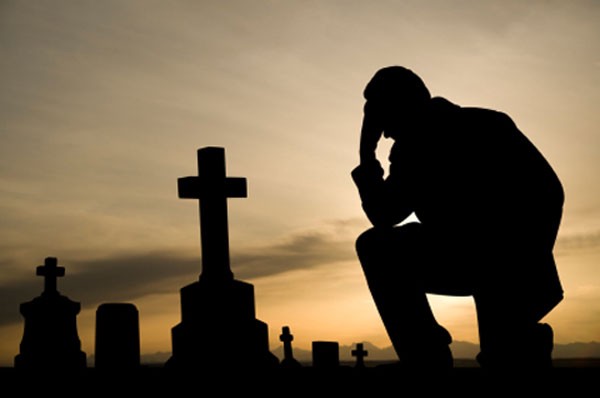The events of recent weeks in my life have been a powerful wake-up call and reminder for me to write about preparation for an unexpected death. After a year-long battle with cancer, I lost a dear friend I have known for over 25 years, way back to the time I was still praying about whether to enter seminary. She was a delightful friend with a keen sense of humor and a very generous spirit. Among many gifts to me, she coordinated all the many details of the celebration of my priestly ordination. (Not as complicated as planning a wedding, but a lot of work nonetheless.) At the time of her death in her young 50s, she had two young boys who were suddenly left without a mother and a grieving husband. In the parish, we lost an active member in her 40s who was always keen to serve, especially the women of the parish and the young school-age children who needed to learn the faith she was so enthusiastic about sharing.
The men of my own family are prone to early death. My grandfather died suddenly in his 40s, my father suffered a near-fatal heart attack in his 50s, and a brother died suddenly in his 50s as well. So I am frequently reminded not to put off until tomorrow efforts to make sure that I remain in a state of grace or presume that I will have time “later” to grow in holiness.
In many ways, that is at the core of what we are all about during this Lenten season. As many Lents as I have been through (four decades now as an adult), still each year it seems to come as a bracing wake-up call when we have to deny ourselves things and step up our prayer life and works of mercy (like the ice-cold water we mischievous children growing up would pour on our brothers and sisters when they were sleeping in late to wake them up in the morning!). It is far too easy to revert to the complacency of spiritual laziness and the self-satisfaction of focusing on pleasing ourselves rather than the Lord.
For all those reasons and more, I recommend praying this traditional prayer (at bottom of column below) to be delivered from an “unprovided death” – one where we are not spiritually prepared for our particular judgment at the end of our earthly life.
On that note, I also wanted to offer some practical advice for what to do when our death is anticipated. The Church highly recommends seeking out the grace of the sacrament of anointing whenever someone begins to suffer a terminal illness. It is not wise to wait until your loved one is on his death bed, because the priest may not be available in time or the death may come faster than the medical personal anticipate. (Sacraments can only be administered to the living). Certainly, however, if someone is on his death bed – even unexpectedly – it is wise to call a priest immediately. Currently in our parishes, we have an emergency telephone access system: If a person needs a priest urgently (such as that deathbed situation) you can simply call either parish phone number and press “9” to ring my pager. I carry that with me nearly 24 hours a day, seven days a week and keep it on while sleeping. I imagine the new pastor in July will devise a similar emergency system as well.
When administering the sacrament, if a person is quite near death, the priest is granted the power by Christ and His successor on earth to give what is called an “apostolic pardon.” That means that, even if the person is not responsive, as long as his heart is open to God’s mercy and seeking to do His will, he will not only be forgiven of his sins but even released from some of the punishment he would ordinarily have to undergo in the final purification before Heaven (purgatory).
Next, I wanted to clear up some common confusion between when to receive the sacrament of anointing vs. the sacrament of confession. While they can be administered together, ordinarily the sacrament of anointing is only administered in cases of grave illnesses (potentially fatal). Thus, for instance, if someone is undergoing minor surgery which is not especially risky, it is better to seek out the sacrament of confession where the forgiveness of sins is assured if one has a contrite heart.
Lastly, I recommend reading sometime, maybe this Lent, a book entitled Church of Cowards by author Matt Walsh. He is not a theologian, but provides common-sense perspectives on stepping up our faith game. More on that book later.
Most merciful Lord Jesus, by Your agony and sweating blood, and by Your death, deliver me, I beg You, from a sudden and unprovided death.
O most gentle Lord Jesus, by Your cruel and ignominious scourging and crowning with thorns, by Your cross and most bitter Passion, and by Your goodness, I humbly pray, let me not die unprepared and pass from this life without the holy sacraments.
Jesus, my Beloved, my Lord, by all Your labors and sorrows, by Your Precious Blood, and by Your most holy wounds, and by those last words spoken on the cross by You: “My God, my God, why hast Thou forsaken me?” and again: “Father, into Your hands I commend My spirit,” most ardently I pray, save me from a sudden death.
Your hands, O Redeemer have wholly made and formed me: Do not allow death to take me unawares; give me, I beg You, time for penance; grant that I may pass from this life happily in Your grace, that I may love You with my whole heart, and praise and bless You forever and ever.
Amen.
[From catholic.org prayers]
